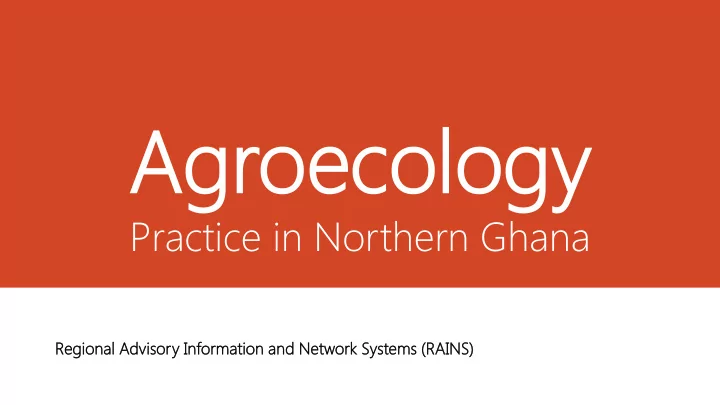

Agr Agroecol oecology ogy Practice in Northern Ghana Regi giona onal l Adv dvisor sory y Info forma rmation tion and d Network ork Systems ems (RAINS) )
Introduction The Current Challenges to Agriculture Posed by food insecurity and climate change are serious • A paradox of increased food production and growing hunger globally • Conventional Agriculture has contributed immensely to CC crises • Poor countries especially Smallholders will be affected • IAASTD – ‘’ ..business as usual no longer and option’’…. the future of Agriculture is in biodiversity • and agroecology
A gr grow owing ing cri risis sis fa farming rming Root causes and drivers of the crisis • declining soil fertility (reduced fallow, population Increase) • climate change (late, irregular rains) Exacerbating factors: • Gender inequality, poor nutrition practices, • inadequate community capacity for rapid adaptation • Inappropriate government policies for agriculture
Working rking wi with th fa family mily fa farmer mers to to ad adapt apt to cl to clim imate ate ch chan ange? ge? Alarming projections of a temperature rise of 3°C to 5° C above today’s already high temperatures by 2050. • By 2050, scientists predict a decrease in agricultural production for most cereals and staples – Communities already recording only half of the previous years’ production. Increasing the risk of food insecurity.
Fi Fiel eld d preparation eparation 6
Farmer Managed Natural Regeneration of Trees Pathways to Resilience 7
Unwanted trees are removed Productive Trees are managed
Transformation achieved by a farmer applying FMNR t
FMNR Growing trees and feed at the same time on the same plot
Community Seed and Knowledge • Promoting local seed production and utilization
Community Seed and Knowledge Community participation at the heart of processes – Community Dialogues Historical Timelines & Maps Seasonal Maps
AE is about integrated soil management. Maize intercropped with cowpea fixes nitrogen
Yields can be increase through Agroecology without chemical fertilizers
Community Seed Knowledge • The initiative succeeded in raising community members’ awareness of climate change and its impact on rural livelihoods. • Revived revived a number of indigenous seed varieties that were on the verge of extinction (bambara beans, cowpea, sanze, bungu, agusi, neri, late millet and sesame) – thereby improving access and diversifying their diets. • Local communities hold the key to tried and tested indigenous Knowledge Systems and as such are vital actors in Climate Change adaptation initiatives.
Rock ck bunds ds along ng th the e contou tour 17
Ridging Bonding
Compost Application
Leaves from pruned trees are left on the field to rot. Tree reduces heat intensity and improves moisture
Upscaling of Agroecology • Upscaling research into AE – Testing Viability of Approaches and Cases Studies • For Africa, Increase documentation of successful and AE approaches • Change in existing policy environment needed.
THANK YOU
Recommend
More recommend